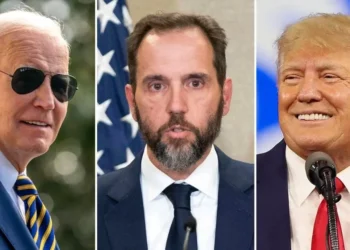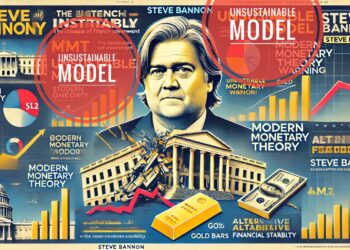Michael Schuman’s article in The Atlantic argues that the Chinese Communist Party’s dictator Xi Jinping wants President Trump to win reelection. According to Schuman, the reason is that Biden has hit the People’s Republic of China (PRC) harder than Trump. Schuman submits that this is evinced in Biden’s technology policy, specifically "effectively” barring the export to the PRC and "revitalized” the global alliance network. In contrast, Beijing saw Trump as "a mere nuisance.” Were Trump reelected, Schuman submits he would focus on trade and "waver” on human rights and Taiwan, while "likely to fawn over Xi and other dictators.”
Reading the article, it offers a thoroughly flawed consideration of the respective merits of Trump versus Biden’s approach to the PRC. There are three major problems with his argument.
First, the Trump presidency was the first, and thus far only, administration to identify the PRC as America’s enemy. That is a fundamental paradigm shift in Sino-American relations. The Trump presidency that broke with the Engagement school of thought—trade and investment in the PRC would change it—that defined the old paradigm of Sino-American relations since the end of the Cold War and from which the American elite, not the least the Biden family, profited handsomely. As part of his paradigm shifting understanding of the PRC, the Trump presidency correctly identified that the U.S. was in a new Cold War with the PRC, and the policies and strategy documents, such as the National Security Strategy, unclassified summary of the Pentagon’s National Defense Strategy, Nuclear Posture Review, and DHS’s Strategic Action Plan to Counter the Threat Posed by the People’s Republic of China reflected this. Senior administration officials, including Robert O’Brien, Mike Pompeo, and Matt Pottinger provided bold and clear explanations of why the PRC is an existential threat to the United States.
The Biden administration’s documents and the remarks of their officials reflect the engagement school’s paradigm and thus its pusillanimous approach to the PRC. For example, this year started with the humiliation of the PRC’s "Spy Balloon” violating America’s sovereignty. Also this year the Biden Administration began in earnest to implement the failed engagement paradigm and to drive a stake through the Trump policy of confrontation with the PRC. The first step in the Biden "reset” of relations came in May when CIA Director Nicholas Burns made a secret trip to Beijing to meet with his Chinese counterparts and to emphasize "the importance of maintaining open lines of communication in intelligence channels.” That is the logic and rhetoric of the disastrous engagement paradigm. Burns’ trip started a cavalcade of visits to the PRC from senior Biden officials.
It was a parade seemingly without end. By June, Secretary of State Anthony Blinken visited the PRC. This was quickly followed up by Treasury Secretary Janet Yellen, Climate Czar John F. Kerry, former Secretary of State and centenarian "Old Friend” of China the late Henry Kissinger traveled to Beijing in July. Secretary of Commerce Gina Raimondo went in August, and was the most explicit regarding why nothing could jeopardize the approximate $750 billion per year trade relationship with the PRC. In addition, there were multiple meetings by National Security Advisor Jake Sullivan with his PRC counterpart Wang Yi in Vienna and Malta in May and September, respectively.
But the apotheosis of the engagement paradigm the summit meeting in November between Xi and Biden. The meeting with Biden was just Xi’s doormat to get to what really mattered, the meeting with the 400 business leaders. Never in our history have Americans so openly and brazenly celebrated a dictator. It was an appalling and shameful moment in American history.
Like the restoration of the Bourbon monarchy in France after Napoleon, the Biden administration is defined by its desire to return to the Old Regime: the paradigm of engagement where the PRC benefits as do the American elite. In an essay comprised of oversights and omissions perhaps the greatest is that it neglects to mention that Biden’s history of corruption leaves him uniquely vulnerable to pressure from Xi. Even if Rep. James Comer and his colleagues do not yet know all of the details of the Biden family’s corruption, Xi does. Xi understands that Biden is a corrupt president who has taken at least tens of millions of dollars from Chinese entities (and those of other countries) and remains vulnerable to coercion.
As important as this is, of even greater significance is that the Biden administration is not pressuring Xi at a time when Xi is greatly weakened by the collapse of the PRC’s economy, and the impact of Xi’s own paranoia on the Chinese Communist Party. The CCP is illegitimate and if pressured, might fall. Losing a golden opportunity, Biden does his utmost to strengthen Xi and the CCP at a time of great peril. Xi’s greatest trepidation is that Trump returns, and capitalizes upon Xi’s vulnerabilities to end the CCP’s tyranny as Reagan did the Soviet Union’s.
Second, Schuman argues that Biden offers a superior foreign policy. Nice try. During the disastrous Biden presidency, the U.S. withdrew from Afghanistan in a nightmare only rivaled by the U.S. evacuation of Phnom Penh and Saigon in 1975. The U.S. abandoned $85 billion in modern military equipment to the Taliban and allowed the PRC to inherit the modern bases the U.S. built. In addition, Russia invaded Ukraine with Xi’s blessing and remarkably dangerous entente was created between Russia and the PRC that is deeply damaging to American security. Moreover, the horrific October 7 Hamas attacks against Israel started a major conflict in the Middle East and runs the risk of escalating into a U.S. conflict with Iran. On Taiwan, the Trump administration accelerated diplomatic support for Taipei and provided arms purchases and cooperation with Taiwan. Those were bold actions, and more are needed, but they won’t come from the Biden administration.
Third, Schuman rightfully notes that the world looks to the U.S. for leadership. However, despite his claim, they had it under Trump and they do not under Biden. What makes the Biden presidency unique is the degree of humiliation of the U.S. accepted by the administration. This principle of humiliation that defines the Biden presidency may also be witnessed in the administration’s other policies, including U.S. policy towards Iran, in the open U.S. southern border where PRC agents and terrorists are entering America, and in countless other acts. Although largely ignored by the U.S. media, Biden’s malfeasance was captured by his failure to travel as scheduled to Papua New Guinea and Australia after the May G-7 meeting in Hiroshima because he was too tired or too ill to attend.
That embarrassment is ignored by Schuman. But it would have been one Biden’s most important of his administration for two reasons. The visit would have provided Biden with demonstrable support for Australia and Papua New Guinea in the struggle against the PRC. Biden’s visit to Papua New Guinea would have been a first for a U.S. president, a strong symbol of resistance to the PRC’s increasing pressure against the states of the region, a major example of the U.S. determination to rekindle ties forged in World War II, and to underscore the importance of the southwest and south Pacific for U.S. diplomacy.
In addition, the visit to Australia would have included a meeting of the Quadrilateral Security Dialogue (the Quad) of Australia, India, Japan, and the U.S. This meeting was cancelled although Indian prime minister Narendra Modi will meet with Australian prime minister Anthony Albanese. The Quad gathering would have been a consequential meeting of four major democratic states to discuss cooperation against the threat posed by the PRC. Biden’s visit would have been the first by a U.S. president since 2014. He would have addressed a joint sitting of the Australian Parliament and would have attended a Quad meeting at the Sydney Opera House. By not showing up, Biden caused doubts about the reliability of the U.S. as an ally.
The Biden administration will not stop its effort to return the U.S. to the failed paradigm of engagement. But the world sees Biden’s actions clearly. It knows that Biden has run out of gas. His mental and physical decline well capture the trajectory of his administration. Contrary to Schuman’s assertations, this feckless leader is exactly what Xi wants. The return of Trump—and the new paradigm that accurately sees the PRC as
the enemy—is Xi’s greatest fear.
Bradley A. Thayer is a Contributing Columnist for
Warroom.




